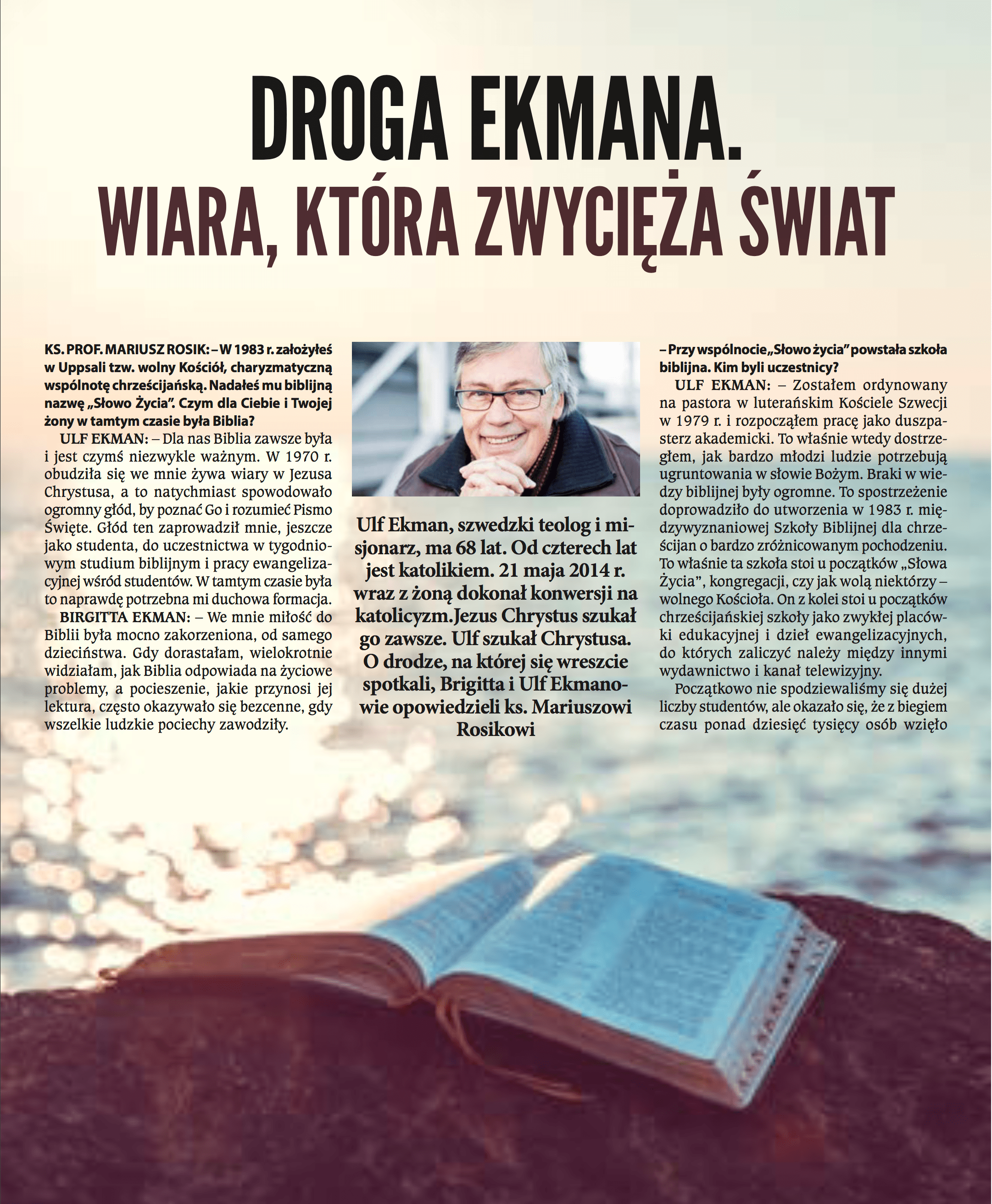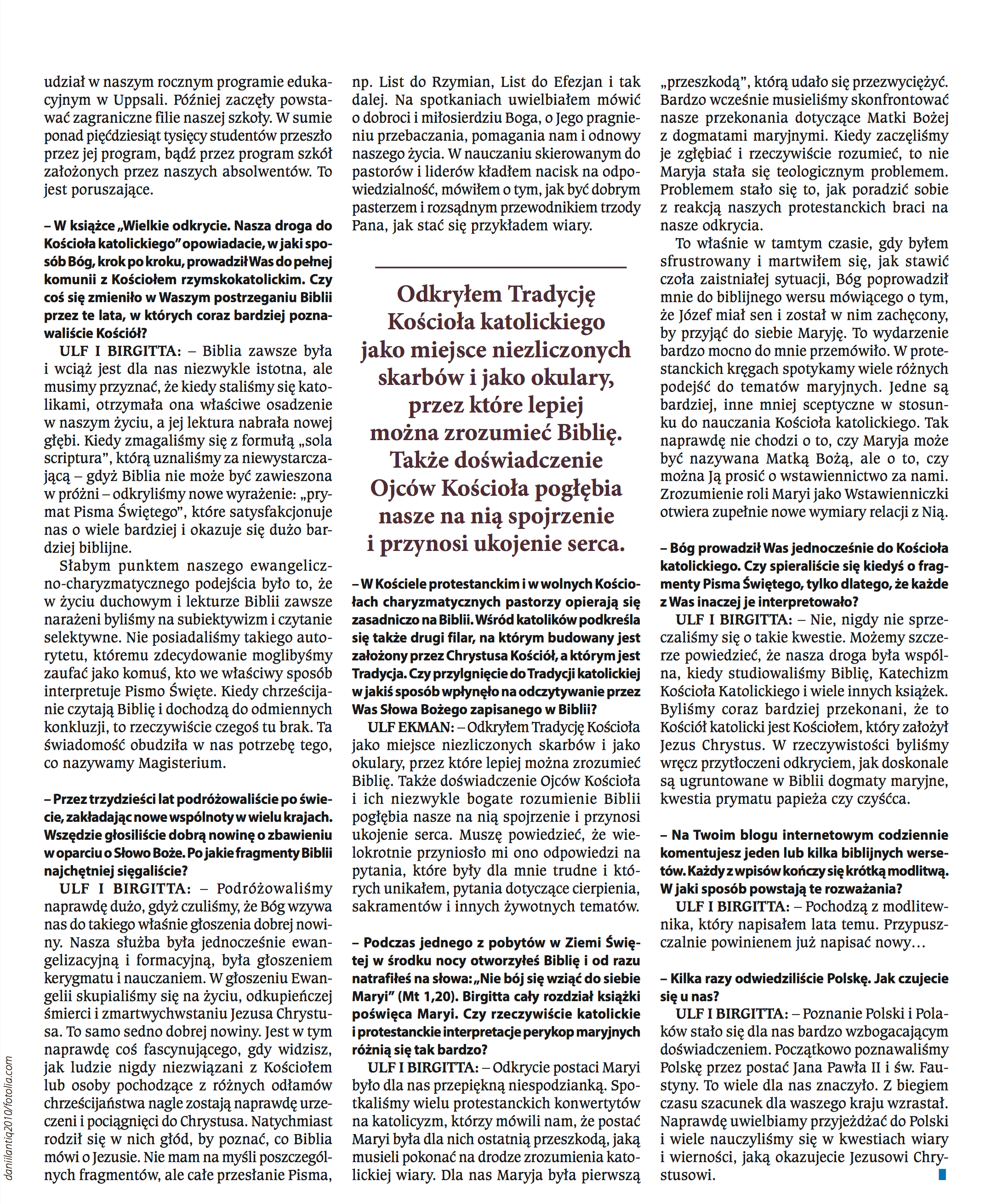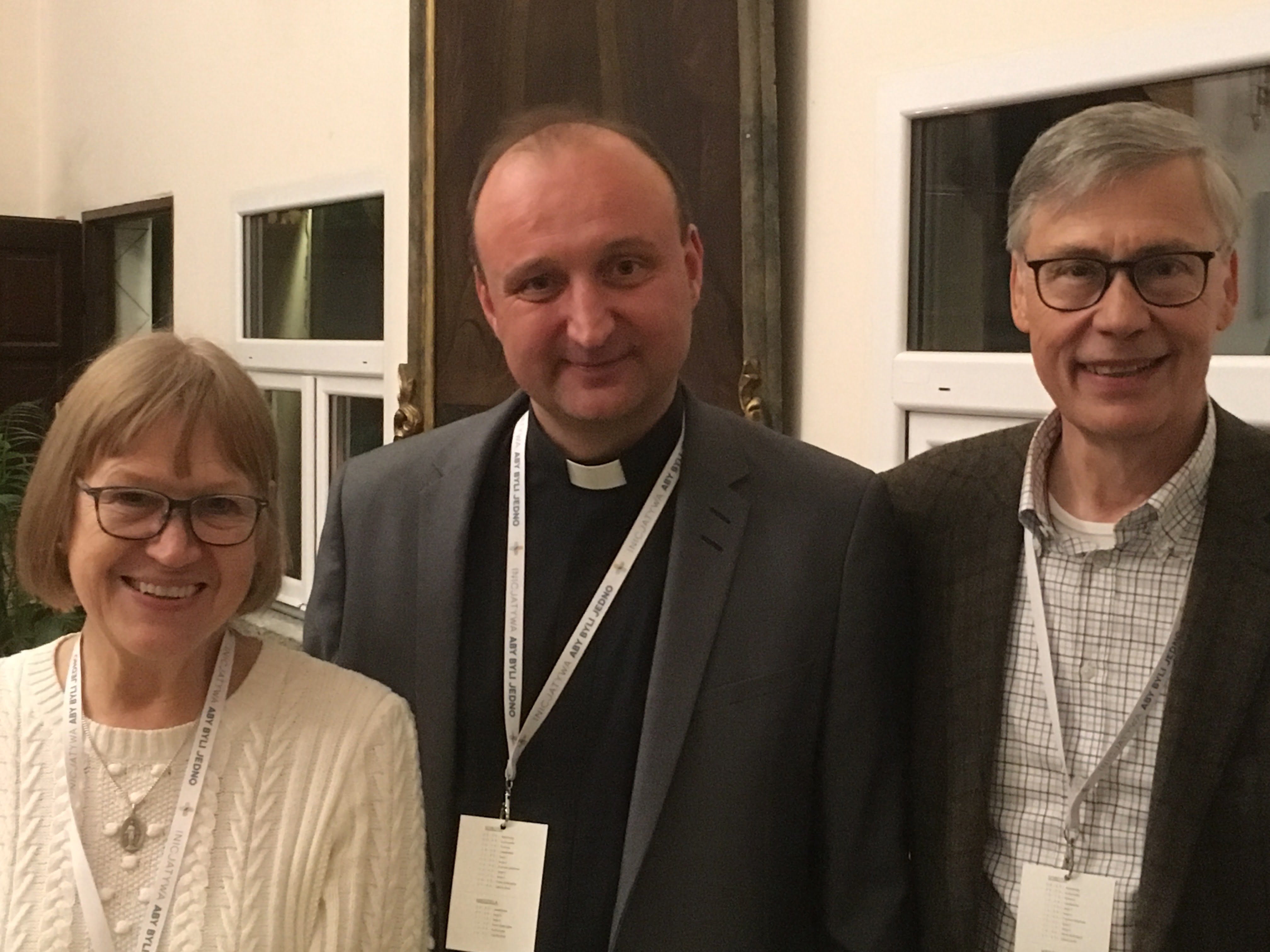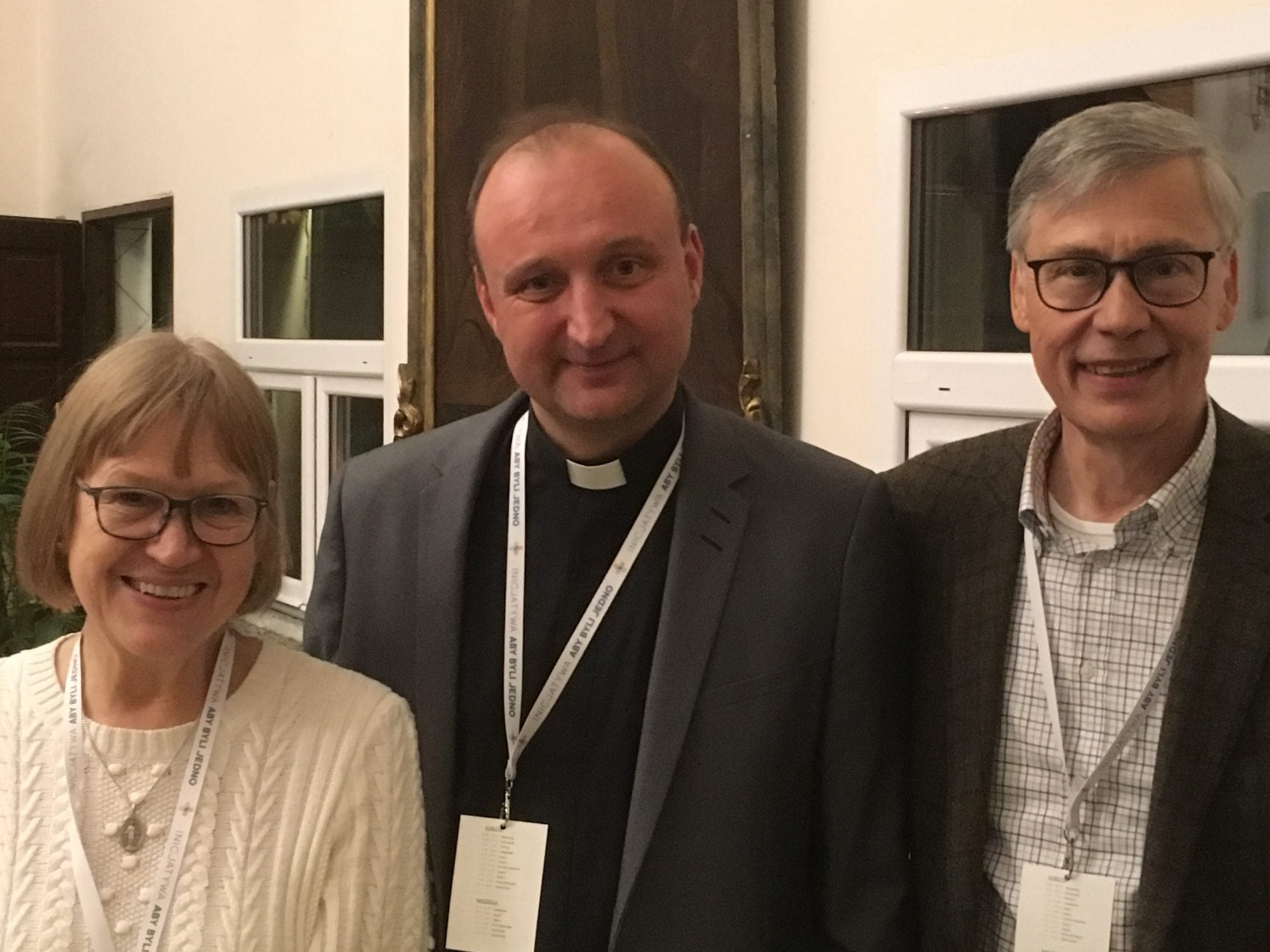Z Birgittą i Ulfem Ekmanami
Ulf Ekman to urodzony 8 grudnia 1950 w Göteborgu – szwedzki teolog, misjonarz i etnograf. W 1970 ukończył szkołę średnią. Następnie studiował etnografię, historię i teologię na Uniwersytecie w Uppsali. W styczniu 1979 był ordynowany w luterańskim Kościele Szwecji. Następnie przez kilka lat pracował jako kapelan na uniwersytecie w Uppsali. Jest założycielem szwedzkiego ewangelikalnego kościoła charyzmatycznego Livets Ord (Słowo Życia), który prowadził do roku 2002, kiedy to przekazał przywództwo pastorowi Robertowi Ekhowi, angażując się w działalność misyjną poza Szwecją. Jako misjonarz swojej wspólnoty eklezjalnej działał w Bangladeszu, Rosji, Armenii, Azerbejdżanie, Tadżykistanie, Albanii, w Izraelu, w Indiach i na Ukrainie. Wraz z Livets Ord organizował coroczne spotkania „Europe Conference”. Współpracując z „New Generation Church”, Livets Ord zakładało wspólnoty wyznaniowe w dużych miastach ZSRR i w innych rajach na świecie.
9 marca 2014 ogłosił, że wraz z żoną Birgittą zamierza oficjalnie wstąpić do Kościoła katolickiego, co nastąpiło oficjalnie 21 maja 2014 roku.


„Droga Ekmana. Wiara, która zwycięża świat”, Niedziela Wrocławska 8 (2018) 6-7.
Artykuł oryginalnie: tutaj.
***

ENGLISH VERSION
Ulf Ekman (born 8 December 1950 in Gothenburg) is a former charismatic pastor and the founder of the charismatic Livets Ord (Word of Life) organization in Sweden, which brought the Word of Faith movement to that country. Ekman is now Catholic. Ekman is married to Birgitta Ekman and has 4 sons, Aron, Jonathan, Samuel and Benjamin. In his youth, Ekman was a member of a Swedish Communist party before becoming a Christian, graduating from high school in 1970. He studied ethnography, history and theology at Uppsala University and in January 1979 was ordained in the Church of Sweden, returning to Uppsala University to work as the chaplain for several years. On 9 March 2014, Ekman announced his and his wife’s leaving Livets Ord with the intent of joining the Catholic Church.
Mariusz Rosik: Ulf, you established the so-called free church, a nondenominational, charismatic Christian community in Uppsala in 1983. Over time, it became the largest free church in Sweden, and probably in all Scandinavia. You have named your community „The Word of Life.” This name directs our thoughts to Scripture. What was the Bible for you and your wife at that time?
Ulf: For us the Bible was, and is very important. I, Ulf, came to living faith in Jesus Christ in 1970 and immediately it created in me an enormous hunger to get to know Jesus more and to understand the Scriptures. This led me as a university student to participate in weekly Bible studies and to evangelization among students, which was very formative to my Christian life at that time.
Birgitta: I had a firmly rooted love for the Bible since childhood. As I grew up I saw clearly how the Bible time and time again gave the answers to life’s problems and also gave comfort when human comfort weren’t enough.
With the foundation of the community „Word of Life” a biblical school was also established. Who were the participants of this school? What did the courses look like? What were the subjects you were concentrating on? Did you have any special handbooks for the courses or it was just Bible?
Ulf: I was ordained a Lutheran minister in 1979 and worked as a University Chaplain. There I saw a big need for grounding young Christians in the Word of God. There was much lack of Bible knowledge. This led us to start an inter-denominational Bible School in 1983, for Christians from all different backgrounds. This school was the start of Word of Life and it led to the founding of a local congregation/church, a Christian school and a large missions work including a Publishing House and TV-ministry. We did not expect so many students in the beginning, but over the years over 10 000 student came for at least one year in Uppsala. As the school expanded internationally over 50 000 students have taken these one year courses in our schools, or in schools started by students that went to one of these schools. It was quite a move.
In the Bible school we had a lot of literature written by various Evangelical, Charismatic authors. As years went by I wrote many books myself in subjects that were taught in the school. The courses were concentrated on the life of the believer, the lay people. The purpose was to inspire, to deepen and to mobilize laity to fulfill the God-given call to be witnesses in their daily life, in the market place, in schools, in industry, in the homes, wherever they lived out their calling. The purpose was also to deepen their interior life and ground them thoroughly in the Scriptures. The courses involved basic courses in Old Testament, New Testament, basic tenets of faith, Faith as a force and virtue in their personal life, how to evangelize, how to be led by the Sprit in our daily lives, the Gifts of the Sprit, the fruit of the Sprit, how to engage in and deepen your personal prayer life, Healing and Suffering and other courses related to this.
I am after the fascinating reading of your – I mean both of you – book „Great Discovery. Our Way to the Catholic Church.” You tell in this wonderful testimony how God, step by step, led you to full communion with the Roman Catholic Church. Has something changed in your perception of the Bible during these years in which you became more and more acquainted with the Church?
Ulf and Birgitta: The Bible has always and is today very important but we do say that it found its place and was given a new depth as we became Catholics. As we were struggling with the concept of “Sola Scriptura” which we found unsatisfactory – the Bible cannot exist in a vacuum – we found that the term “the primacy of Scripture” was more satisfactory and actually more scriptural. The weakness in our evangelical/charismatic background, when it came to the spiritual life and the reading of the Scriptures, was definitely the danger of subjectivism and being selective in your reading. The lack in our spiritual milieu, of a reliable teaching authority troubled us. There was really never any decisive authority that could give the proper understanding and interpretation of the Bible. When Christians reading the same Bible come to so many different conclusions, something important is missing. This realization awakened in us the need of a Magisterium.
As pastor you traveled the world for thirty years with your wife Birgitta, establishing new communities in many countries. You visited, among others, the Soviet Union (later Russia), Bangladesh, Armenia, Azerbaijan, Albania, Turkey, India, Ukraine, as well as Israel. Everywhere you have proclaimed the good news of salvation and you based it on the Word of God. What biblical fragments were most frequently the subject of your preaching?
Ulf: We travelled a lot and felt it was our calling to proclaim the Good News, the Gospel. So our ministry was both evangelistic and formative, preaching and teaching. In the proclamation of the Gospel, the life, the atoning death and the resurrection of Jesus Christ was the central message. It is so fascinating to see how people from a totally unchurched background as well as from a more Christian background are being so fascinated and drawn to the person of Jesus Christ when he is presented to them. And to believers, there is a hunger to know Jesus Christ in the Scriptures. Not just selective Bible verses but to know the main body of teaching in the epistles; the book of Romans, Ephesians and so on. In evangelistic meetings I loved to proclaim the goodness and mercy of God, his willingness to forgive, help and restore us. To pastors and leaders I spoke more of the responsibility to be good shepherds and sound leaders to the flock, being examples of faith.
In the Protestant Church and in the free charismatic Churches, pastors essentially based on the Bible, preparing their preaching and teaching. Among the Catholics we emphasize also the second pillar, on which the Church founded by Christ is built. I mean the Tradition. Has your adhering to Catholic Tradition somehow influenced the readings of God’s Word written in the Bible?
Ulf: I found Tradition to be a chest full of treasures and the lens whereby how to understand the Scriptures. Also the experience of the Church Fathers and their rich understanding of Scripture deepens and satisfies the heart in a most beautiful way. It has also given me clear answers to questions I did not understand or avoided, such as suffering, the Sacraments and other vital subjects.
During one of your stay in the Holy Land one night, just in the middle of the night, you opened the Bible and immediately came across the words, „Do not be afraid to take Mary” (Mt 1,20). Birgitta devoted to Mary, the Mother of God, a whole chapter of the book. Are the Catholic and Protestant interpretations of the biblical texts about Mary really so different?
Ulf: For us the discovery of Mary was a happy surprise. We have met many protestant converts who have said that Mary was the last and most difficult obstacle for them, as they struggled to understand the Catholic faith. For us, Mary was the first “obstacle” we felt we had to overcome. Very early on our spiritual journey we were confronted with her and the major Marian dogmas. When we studied them and understood them, Mary was not a theological problem. But then we had the problem of how to cope with our protestant brothers’ reaction to our discoveries. It was in that setting, when I was frustrated and worried about this that I felt I was led to the Bible verse where St. Joseph was having a dream, and was encouraged not to be afraid of receiving Mary unto himself. That spoke very powerfully to me in my own situation. In Protestant circles there is a variety of views on Mary, more or less skeptical about the Catholic understanding. The question is really not if she can be called the Mother of God, but whether we can ask her to pray for us. To understand her role as Intercessor opens a whole new dimension of relationship.
Birgitta and you are a wonderful couple, and your path of faith is a common way for both you and your wife. God led you simultaneously to the Catholic Church. Did the Bible play a key role in this process? Have you for example disagreed or even argued about different passages of the Scripture, because each of you interpreted them differently?
Ulf and Birgitta: No, we have never argued about these things. We can honestly say that we have walked together and that, as we have studied the Bible, the Catechism of the Catholic Church and many other books, we were more and more convinced that the Catholic Church is the Church that Jesus Christ founded. Actually we where overwhelmed by how well founded the dogmas about Mary, the Petrine ministry and even Purgatory are in the Bible.
On your online blog, both in Swedish and in English, you put the „Daily Devotion” section. Every day you comment in very simple and deep way one or few verses of the Bible. Each of the entries ends with a short prayer. How do you write these reflections?
Ulf: They come from a Devotional book that I wrote a number of years ago. Perhaps I should write a new one soon…
The last question does not concern directly the Bible. Important figures in your way of faith include Poles, St. Faustina and St. Pope John Paul II. You have visited Poland several times. How do you find our country? How do you feel among the Poles?
Ulf and Birgitta: It has been such a rich experience to get to know Poland and the Polish people. Our initial contact with Poland and the Catholic faith was through Saint John Paul II and St. Faustina. This meant so much to us. And as time has gone we have grown in appreciation of your country. We truly love to visit Poland and have learned so much from the rich faith and fidelity that you as a nation have showed to Jesus Christ.
Thank you very much for the conversation.
Polub stronę na Facebook

